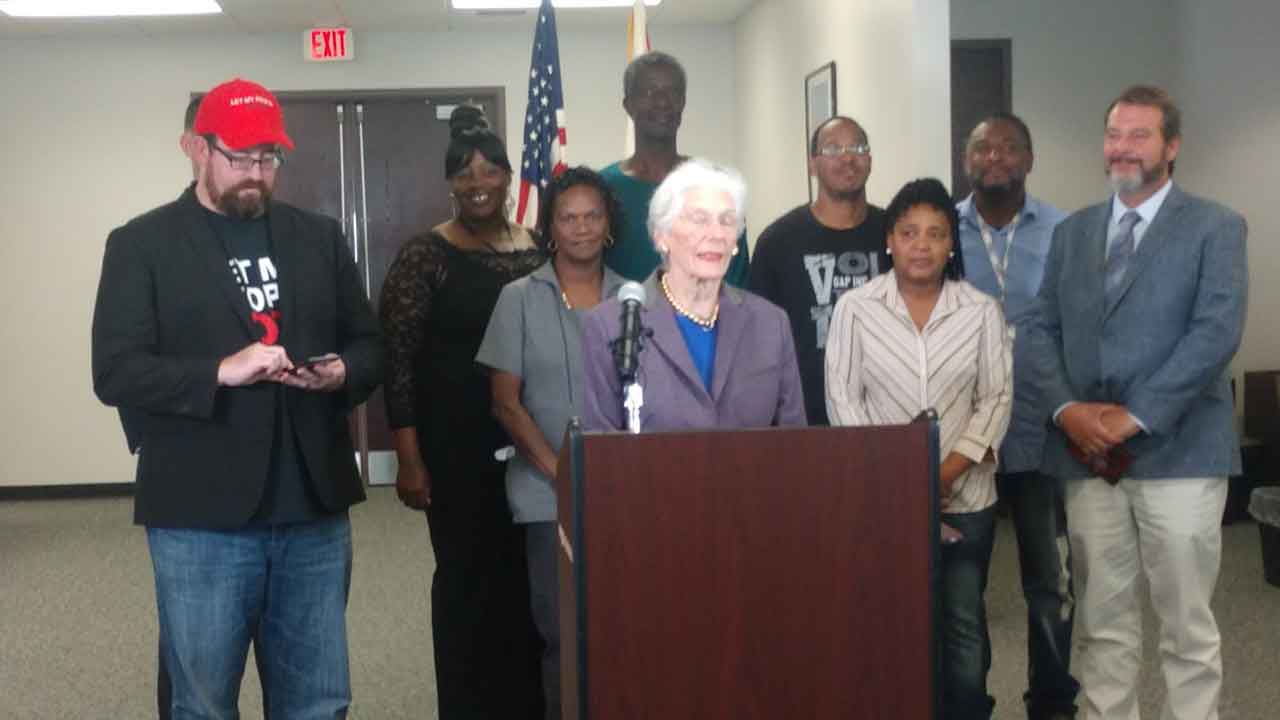Spectrum Bay News 9 Political Reporter Mitch Perry is looking for deeper meaning in politics and government so our local stories have more of a connection in your daily life.
TAMPA, Fla. — In Hillsborough County , 31 former felons received an early Christmas gift on Friday – the restoration of their voting rights.
- Florida Rights Restoration Coalition raising funds for effort since spring
- Coalition will distribute donations to help nearly 200 people
- More Hillsborough County stories
It was part of a collaborative effort between the Florida Rights Restoration Coalition (FRRC) and Hillsborough County Clerk of the Court Pat Frank.
State law says that felons must pay off their outstanding legal obligations before they can register to vote.
In Hillsborough County, State Attorney Andrew Warren unveiled a plan this week for felons to be able to vote.
Friday’s event was one of 10 around the state during which the coalition will distribute donations to help nearly 200 people complete their sentences and become eligible to vote.
The FRRC was the leading advocacy group trying to get Amendment 4 passed in 2018. That’s the constitutional amendment that called for automatically restoring the voting rights to an estimated 1.4 million felons in Florida – one of just a handful of states that do not automatically restore such rights upon the completion of a criminal sentence.
The Florida Legislature then passed a bill this spring that required that all fines, fees and restitution that a felony owed must be paid before those voting rights could be restored, leading to several civil liberties and voting rights groups suing the state.
While that case will go before a federal judge in March, the FRRC has been raising funds since the bill passed to help pay off the costs for some of those “returning citizens’ who still owe such financial obligations.
Tampa resident Ronnie Raddish spent considerable time in prison in the 1980s and 1990s on a variety of drug and grand theft convictions. He last served time in prison in 2006, but has been unable to vote since then.
Upon the passage of Amendment 4, he said he was excited to register to vote. Then the legislation was signed by the governor requiring that financial obligations still needed to be paid off.
“It was something I felt that should have come a long time ago, as I’ve been in trouble in the past, and once you pay your debts to society, you should automatically get your rights back to vote,” he told reporters before a formal press conference was held at the Hillsborough County Courthouse in downtown Tampa on Friday.
Neil Volz, the political director with the FRRC, said his organization has raised around $500,000 since it created a “fines and fees fund” this summer. He says they spent about $300,000 on getting paying off the outstanding legal obligations to around 200 people this week.
Cecilia Washington said she had just completed her sentence for committing fraud in September. She literally has no idea how much she owes in fines and fees, and says she was absolutely stunned when she received a call this week from the FRRC saying that they had paid off her fines, allowing her to become eligible to vote.
“I’m so grateful,” she said. “I’m about to cry because you know – who does something like this for someone like me? It’s really real. It’s not a joke. It’s not a gimmick.”
Washington said she has served time in prison on three different occasions, and said it feels amazing to have her voice matter again. “I can’t wait until I will be able to register, because I’m running down to the polls!” she exclaimed.
At least in Hillsborough County, the payment of outstanding fines and fees was a collaborative effort between the Clerk of the Courts office and the FRRC.
Clerk of the Court Pat Frank said that the FRRC paid off 60 percent of the money owed, and her office agreed to reduce the fines and fees by the remaining 40 percent.
“These are fines and fees and costs that have not been collected. We have them in the hands of a collection agency which receives 40 percent,” she said. “So this is a plus for everyone. The collection agencies are not going to get their money. The probability is they wouldn’t get it, anyhow. So it’s a ‘win-win,’ and the real winners are the people who are going to be 100 percent citizens.”
Hillsborough County Clerk of the Court spokesman Tom Scherberger said that the FRRC originally sent them a list of 72 felons in the county who they were looking at helping pay off outstanding fines and fees. Upon review, the clerk's office determined that the majority owed fines and fees in other counties, or the obligations were too costly.
That's what led to the final list of 31 people that they were able to help complete their sentences this week.



